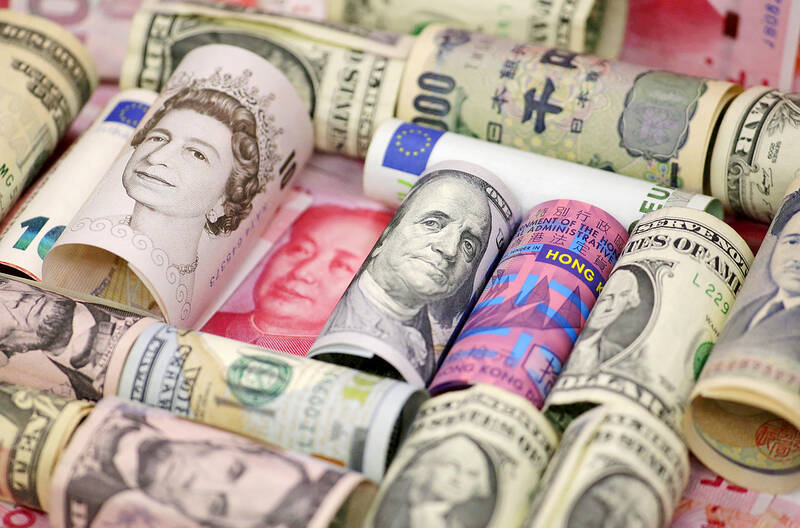Taiwan’s foreign exchange reserves last month fell by US$1.06 billion to US$569.54 billion from the previous month, ending two straight months of sequential gains, as the US dollar rose and eroded the value of other reserve currencies, the central bank said yesterday.
In addition, the central bank intervened in the local market last month to shore up the local currency, which weighed on overall foreign exchange reserves, Department of Foreign Exchange Director-General Eugene Tsai (蔡炯民) said during a news conference in Taipei.
It is not uncommon for the central bank to step in when it sees it necessary to slow excessive fund flows and stabilize the foreign exchange market, Tsai said.

Photo: Reuters
Global funds late last month bought greenback-denominated assets on the expectation that the US Federal Reserve would keep interest rates at high levels, rather than start to lower interest rates as early as next month, Tsai said.
As a result, the US dollar index grew 1.94 percent, while the Japanese yen lost 4.23 percent, the Chinese yuan weakened 1.24 percent and the New Taiwan dollar softened 1.64 percent, he said.
The market is now looking at the Fed’s interest rate cuts beginning in May at the earliest, Tsai said.
The view gained force after recent US GDP and employment data turned out stronger than expected and Fed Chairman Jerome Powell last week called for patience with high interest rates following a rate-setting Federal Open Market Committee meeting, he said.
Though the Financial Supervisory Commission saw fund inflows of more than US$3 billion to the local bourse last month, marking the third consecutive month of net fund inflows, the central bank observed foreign funds wiring profits of a similar size abroad, suggesting a balance in supply and demand, Tsai said.
Tsai linked the foreign fund outflow to a cash dividend distribution on the part of Taiwan Semiconductor Manufacturing Co (台積電), the world’s largest contract chipmaker.
Foreign portfolio managers repeatedly cut and raised holdings in local shares last month and so far this month, in keeping with their ever-changing views on the Fed’s policy intentions, he said.
Despite the retreat in foreign exchange reserves last month, Taiwan holds the world’s fourth-largest foreign exchange reserves after China, Japan and Switzerland, Tsai said.
The central bank would maintain ample foreign exchange reserves to ensure stability in local financial markets and guard against any sudden fund outflows by foreign investors, he added.

NEW IDENTITY: Known for its software, India has expanded into hardware, with its semiconductor industry growing from US$38bn in 2023 to US$45bn to US$50bn India on Saturday inaugurated its first semiconductor assembly and test facility, a milestone in the government’s push to reduce dependence on foreign chipmakers and stake a claim in a sector dominated by China. Indian Prime Minister Narendra Modi opened US firm Micron Technology Inc’s semiconductor assembly, test and packaging unit in his home state of Gujarat, hailing the “dawn of a new era” for India’s technology ambitions. “When young Indians look back in the future, they will see this decade as the turning point in our tech future,” Modi told the event, which was broadcast on his YouTube channel. The plant would convert

‘SEISMIC SHIFT’: The researcher forecast there would be about 1.1 billion mobile shipments this year, down from 1.26 billion the prior year and erasing years of gains The global smartphone market is expected to contract 12.9 percent this year due to the unprecedented memorychip shortage, marking “a crisis like no other,” researcher International Data Corp (IDC) said. The new forecast, a dramatic revision down from earlier estimates, gives the latest accounting of the ongoing memory crunch that is affecting every corner of the electronics industry. The demand for advanced memory to power artificial intelligence (AI) tasks has drained global supply until well into next year and jeopardizes the business model of many smartphone makers. IDC forecast about 1.1 billion mobile shipments this year, down from 1.26 billion the prior

People stand in a Pokemon store in Tokyo on Thursday. One of the world highest-grossing franchises is celebrated its 30th anniversary yesterday.

Zimbabwe’s ban on raw lithium exports is forcing Chinese miners to rethink their strategy, speeding up plans to process the metal locally instead of shipping it to China’s vast rechargeable battery industry. The country is Africa’s largest lithium producer and has one of the world’s largest reserves, according to the US Geological Survey (USGS). Zimbabwe already banned the export of lithium ore in 2022 and last year announced it would halt exports of lithium concentrates from January next year. However, on Wednesday it imposed the ban with immediate effect, leaving unclear what the lithium mining sector would do in the